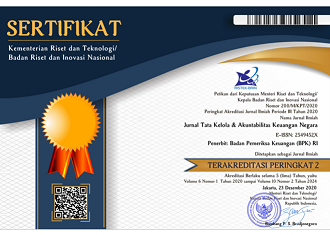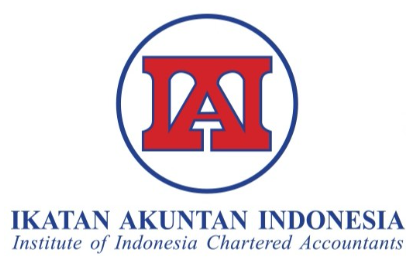Strategic enhancement of local taxing power: A Comprehensive SWOT analysis approach
Keywords:
local taxing power, tax ratio, local tax ratio, SWOT analysis, regional taxesAbstract
Strengthening local taxing power is a crucial element in addressing the insufficient capacity of regional governments to manage their regional assets effectively. This study seeks to identify approaches for strengthening local taxing authority within local administrations. Employing a case study methodology, the research focused on the Jombang regional government, which has a regional tax ratio of 0.6%, significantly lower than the 3% benchmark established by the Ministry of Finance. A content analysis of the data was performed to identify the Strengths, Weaknesses, Opportunities, and Threats (SWOT) in strategy development. The findings suggest that the advised strategy falls within Quadrant I, representing the Strengths–Opportunities (S-O) combination, indicating an aggressive and proactive approach. The S-O strategy refers to leveraging strengths or advantages to seize and capitalize on available opportunities. The suggested operational steps include (1) intensification and extensification; (2) adding tax payment channels; (3) integration/data exchange with other government agencies; (4) intensification of law enforcement cooperation; (5) strengthening regional tax regulations; and (6) improving the quality of human resources. While numerous studies have addressed regional tax management, this research is novel in its focus on developing regional tax enhancement strategies through a comprehensive SWOT analysis.
References
Alfansyur, A., & Mariyani. (2020). Mengelola data penerapan triangulasi teknik, sumber dan waktu pada penelitian pendidikan sosial. Historis: Jurnal Kajian, Penelitian & Pengembangan Pendidikan Sejarah, 5(2), 146-150.
Alm, J. (2019). What motivates tax compliance? (Tulane Economics Working Paper Series 1903). https://repec.tulane.edu/RePEc/pdf/tul1903.pdf.
Alwi, M., Su’un, M., & Amiruddin. (2021). Pengaruh tingkat kemiskinan dan pendapatan per kapita terhadap penerimaan pajak daerah serta opini audit dengan tingkat kepercayaan masyarakat sebagai variabel intervening terhadap penerimaan pajak daerah pemerintah provinsi se-Indonesia. Economos: Jurnal Ekonomi dan Bisnis, 4(1), 54-65. https://doi.org/10.31850/economos.v4i1.780
Ardiansyah, B. G., & Utomo, R. (2018). Penguatan kapasitas pemerintah daerah dengan pemeriksaan pajak. Sembadha, 1(1), 125-129.
Benzaghta, M. A., Elwalda, A., & Mousa, M. M. (2021). SWOT analysis applications: An integrative literature review. Journal of Global Business Insights, 6(1), 55-73.
Borrego, A. C., Lopes, C. M., & Ferreira, C. M. (2016). Tax complexity indices and their relation with tax noncompliance: Empirical evidence from the Portuguese tax professionals. Tekhne, 14(1), 20-30. http://dx.doi.org/10.1016/j.tekhne.2016.07.003
BPK RI. (2020). Laporan Hasil Reviu atas Kemandirian Fiskal Pemerintah Daerah Tahun 2020. https://www.bpk.go.id/assets/files/lkpp/2020/lkpp_2020_1624341245.pdf
Bruno, R. L. (2019). Tax enforcement, tax compliance, and tax morale in transition economies: A theoretical model. European Journal of Political Economy, 56(C), 193–211. http://dx.doi.org/10.1016/j.ejpoleco.2018.08.006
Burhan, A., & Gunadi, G. (2023). Analysis of the implementation strategy for the electronification of local government transactions (ETPD) in Soppeng Regency, Indonesia. Transformasi: Jurnal Manajemen Pemerintahan, 15(01), 89-103. https://doi.org/10.33701/jtp.v15i1.2674
Cheng, L.-C., Chen, K., Lee, M.-C., & Li, K.-M. (2021). User-defined SWOT analysis–A change mining perspective on user-generated content. Information Processing and Management, 58(5), 1-15. https://doi.org/10.1016/j.ipm.2021.102613
David, F. R. (2017). Strategic management: A competitive advantage approach. Person Education, Inc.
de Jantscher, M. C. (1986, December). Problems administering a value-added tax in developing countries. (IMF Working Paper 86/15). https://www.imf.org/en/Publications/WP/Issues/2016/12/30/Problems-of-Administering-a-Value-Added-Tax-in-Developing-Countries-16806
Effendi, M. (2021). Pengembangan sumber daya manusia dalam meningkatkan citra lembaga di lembaga pendidikan Islam. Southeast Asian Journal of Islamic Education Management, 2(1), 39–51. https://doi.org/10.21154/sajiem.v2i1.40
Firmansyah, A., Harryanto., & Trisnawati, E. (2022). Peran mediasi sistem informasi dalam hubungan sosialisasi pajak, sanksi pajak, kesadaran pajak dan kepatuhan wajib pajak orang pribadi. Jurnal Pajak Indonesia (Indonesian Tax Review), 6(1), 130-142.
Gunadi, M. D. (2005). Administrasi pajak. Lembaga Pengkajian Keuangan Publik dan Akuntansi Pemerintah Badan Pendidikan dan Pelatihan Keuangan Departemen Keuangan RI.
Gürel, E., & Tat, M. (2017). SWOT analysis: A theoretical review. The Journal of International Social Research, 10(51), 994-1006. https://doi.org/10.17719/jisr.2017.1832
Hasanusi. (2015). Analisis strategi peningkatan pendapatan asli daerah (PAD) di Kabupaten Lampung Barat. Jurnal Magister Manajemen, 1(1), 1-18.
Hellerstein, W., Buydens, S., & Koulouri, D. (2018). Simplified registration and collection mechanisms for taxpayers that are not located in the jurisdiction of taxation: A review and assessment. (OECD Taxation Working Papers No. 39). https://doi.org/10.1787/64bcf5de-en.
Helms, M. M., & Nixon, J. (2010). Exploring SWOT analysis- Where are we now? Journal of Strategy and Management, 3(3), 215–251. https://doi.org/10.1108/17554251011064837
Hendriyetty, N., Evans, C., Kim, C. J., & Taghizadeh-Hesary, F. (2022). Taxation in the digital economy: New models in Asia and the Pacific (1st Ed.). Routledge. https://doi.org/10.4324/9781003196020
Iqbal, M. (2017). Pengawasan penerimaan pajak hiburan dan restoran pada Dinas Pendapatan Daerah Kota Medan. Jurnal Warta, 51. https://doi.org/10.46576/wdw.v0i51.238
Irsyadinnas, I., Priyatna, C. C., & Ningrum, S. (2023). A SWOT analysis to determine strategies for public information disclosure quality improvement. Indonesian Journal of Multidisciplinary Science, 2(4), 2246-2258. https://doi.org/10.55324/ijoms.v2i4.409
Jonassen, D. H. (2012). Designing for decision making. Education Technology Research and Development, 60(2), 341-359. https://doi.org/10.1007/s11423-011-9230-5
Juliarini, A. (2020). Komparasi penerimaan pajak daerah kota dan kabupaten di Indonesia setelah berlakunya undang-undang pajak daerah dan retribusi daerah. Jurnal BPPK, 13(2), 1-10.
Julyano, M. (2019). Pemahaman terhadap asas kepastian hukum melalui konstruksi penalaran positivisme hukum. Jurnal Crepido, 1(1), 13-22. https://doi.org/10.14710/crepido.1.1.13-22
Juswanto, W., & Abiyunus, Y. F. (2023). Taxing the digitalized economy: An emerging market perspective. In N. Hendriyetty, C. Evans, C. J. Kim, & F. Taghizadeh-Hesary (Eds.), Taxation in the digital economy: New models in Asia and the Pacific (pp. 56-81). Routledge. https://doi.org/10.4324/9781003196020
Keen, M., & Slemrod, J. (2017). Optimal tax administration. Journal of Public Economics, 152, 133–142. https://doi.org/10.1016/j.jpubeco.2017.04.006
Law of the Republic of Indonesia Number 1 of 2022 concerning Financial Relations Between the Central and Regional Governments (Undang-Undang Republik Indonesia Nomor 1 Tahun 2022 tentang Hubungan Keuangan antara Pemerintah Pusat dan Pemerintah Daerah). https://peraturan.bpk.go.id/Details/195696/uu-no-1-tahun-2022
Law of the Republic of Indonesia Number 28 of 2009 concerning Local Taxes and Charges (Undang-Undang Republik Indonesia Nomor 28 Tahun 2009 tentang Pajak Daerah dan Retribusi Daerah). https://peraturan.bpk.go.id/Details/38763/uu-no-28-tahun-2009
Leigh, D. (2010). SWOT Analysis. In K. H. Silber, W. R. Foshay, R. Watkins, D. Leigh, J. L Moseley, & J. C. Dessinger (Eds.), Handbook of improving performance in the workplace (Vol. 1‐3). International Society for Performance Improvement. https://doi.org/10.1002/9780470592663.ch24
Liyana, N. F. (2019). Menakar masalah dan tantangan administrasi pajak: Kepatuhan pajak di era self-assessment system. Jurnal Pajak dan Keuangan Negara (PKN), 1(1), 84-90.
Miles, M., Huberman, A., & Saldana, J. (2014). Qualitative data analysis: A method sourcebook. SAGE Publications.
Mustaqiem. (2008). Pajak daerah dalam transisi otonomi daerah (1st ed.). FH UII Press.
Namugenyi, C., Nimmagadda, S. L., & Reiners, T. (2019). Design of a SWOT analysis model and its evaluation in diverse digital business ecosystem contexts. Procedia of Computer Science, 159, 1145-1154. https://doi.org/10.1016/j.procs.2019.09.283
OECD. (2020). Tax administration responses to COVID-19: Assisting wider government. OECD Publishing. https://doi.org/10.1787/0dc51664-en
Primadini, I., & Gunadi. (2023). Analisis SWOT terhadap kebijakan pajak digital di Indonesia. JRAP (Jurnal Riset Akuntansi Dan Perpajakan), 10(1), 33-47. https://doi.org/10.35838/jrap.2023.010.01.04
Putranto, B. R. H. (2018). Pengaruh budaya organisasi, kompensasi, dan motivasi kerja terhadap kinerja pegawai pada Kantor Pelayanan Pajak Pratama Palu [Unpublished Undergraduated Thesis]. Universitas Tadulako.
Puyt, R. W., Lie, F. B., & Wilderom, C. P. (2023). The origins of the SWOT analysis. Long Range Planning, 56(3), 1-24. https://doi.org/10.1016/j.lrp.2023.102304
Rahayu, A. Y., Khafian, N., Rahmayanti, K. P., Anza, F. A., & Afra, S. A. (2022). Developing Depok’s government strategies for strengthening public services using SWOT analysis. Jurnal Bina Praja, 14(1), 175-187. https://doi.org/10.21787/jbp.14.2022.175-187
Serikova, M., Sembiyeva, L., Mussina, A., Kuchukova, N., & Nurumov, A. (2018). The institutional model of tax administration and aspects of its development. Investment Management and Financial Innovations, 15(3), 283-293. http://doi.org/10.21511/imfi.15(3).2018.23
Sinaga, N. A. (2016). Pemungutan pajak dan permasalahannya di Indonesia. Jurnal Ilmiah Hukum Dirgantara, 7(1), 142-157. http://doi.org/10.35968/jh.v7i1.128
Slemrod, J. (2019). Tax compliance and enforcement. Journal of Economic Literature, 57(4), 904–954. https://doi.org/10.1257/jel.20181437
Sukma, S. S., & Kuncoro, A. R. (2022). Tinjauan kepatuhan kewajiban pajak penghasilan UMKM kuliner malam di wilayah KPP Pratama Madiun. Jurnal Pajak Indonesia (Indonesian Tax Review), 6(2), 235-244. https://doi.org/10.31092/jpi.v6i2.1848
The Directorate General of Fiscal Balance. (-). Serial referensi modernisasi dan perbaikan kebijakan administrasi perpajakan pemerintah daerah: Standar indikator kinerja administrasi pajak daerah (SIKAP). https://djpk.kemenkeu.go.id//wp-content/uploads/2021/10/Trampil-3.pdf
The Directorate General of Fiscal Balance. (2022, September 15). Penguatan local taxation power serta sinergi pusat dan daerah [Press Release]. https://djpk.kemenkeu.go.id/?p=27031
Ter-Minassian, T. (Ed.). (1997). Fiscal federalism in theory and practice. International Monetary Fund. https://doi.org/10.5089/9781557756633.071
Yusuf, A. (2021). Pengaruh jumlah penduduk, produk domestik regional bruto dan inflasi terhadap pendapatan pajak daerah di Malang Raya [Undergraduate thesis, Universitas Brawijaya]. UB Repository. https://repository.ub.ac.id/id/eprint/190900/2/Afifudin%20Yusuf.pdf
Downloads
Submitted
Accepted
Published
How to Cite
Issue
Section
License
Copyright (c) 2025 Jurnal Tata Kelola dan Akuntabilitas Keuangan Negara

This work is licensed under a Creative Commons Attribution-ShareAlike 4.0 International License.

Jurnal Tata Kelola dan Akuntabilitas Keuangan Negara is licensed under
a Creative Commons Attribution-ShareAlike 4.0 International License





















